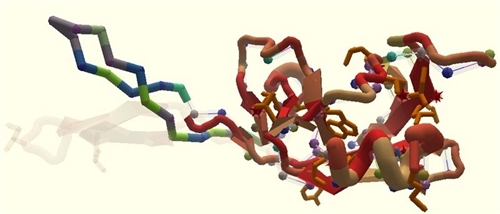Using the games-with-a-purpose Foldit, online gamers have within three weeks (actually, "less than 10 days" according to scientist Firas Khatib) deciphered an enzyme critical to the early development of AIDS that has stumped scientists for a decade.
Developed in 2008 by researchers at the University of Washington, Foldit allows players to solve three-dimensional pattern-matching puzzles—something that the human brain excels at but computers have a difficult time solving (for now)—based off complex proteins.
So it comes to no surprise that within three weeks' time, 12 to 15 gamers called the Foldit Contender Group (not so far from a guild) have come together to provide an accurate 3D model of the crystal structure of M-PMV retroviral protease, which in plain English, is an AIDS-like virus found in monkeys. Figuring out the structure will allow scientists to develop drugs whose molecular structure targets and locks onto those proteins responsible for spreading a disease.
Zoran Popovic, director of University of Washington's Center for Game Science, believes this is a new frontier for gaming and science:
Foldit shows that a game can turn novices into domain experts capable of producing first-class scientific discoveries. We are currently applying the same approach to change the way math and science are taught in school.
Is "citizen science" a part of the future that Deus Ex: Human Revolution was talking about?
[Source]











